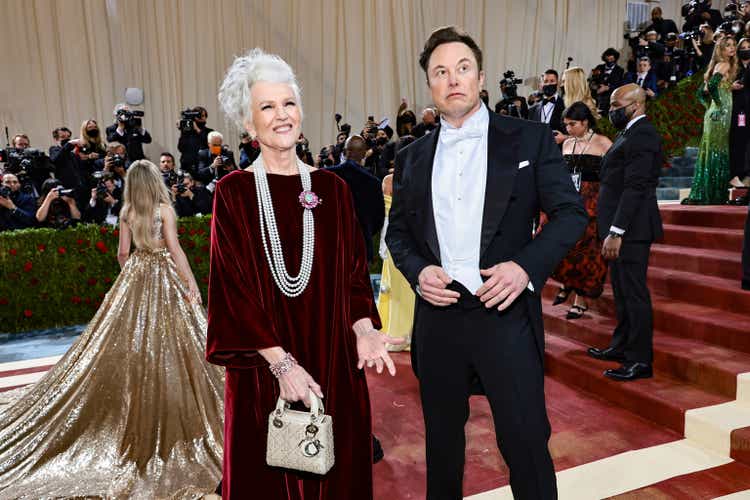
Jamie McCarthy/Getty Images Entertainment
One thing which has always troubled me in regards to Twitter (NYSE:TWTR) deal was the way bankers agreed to fund the deal. Originally Elon Musk secured $46.5 bn in financing commitments out of which $13 bn was debt commitment from Morgan Stanley (MS) and other financial institutions, $12.5 bn was a margin loan against Tesla (TSLA) shares and $21 bn was equity financing commitment from Elon Musk. Later, some terms were modified and equity financing commitment was increased to $27.25 bn while margin loan against Tesla shares was reduced to $6.25 bn while debt commitment of $13 bn remained the same.
Now this $13 bn will go on the books of the new company if it acquires Twitter’s business. If we look at Twitter’s latest balance sheet (as of March 31, 2022), it had ~$2.28 bn in cash and cash equivalents and ~$3.98 bn in short-term investments. Combined, this equals to ~$6.26 bn. On the debt side, it has $3.56 bn in long-term convertible notes and $1.68 bn in long-term debt. So, Twitter has ~$1 bn of net cash on its balance sheet.
A $13 bn loan will bring net debt closer to $12 bn. Net debt can be slightly higher as well if we assume cash burn from one-time deal expenses (investment banking fees, etc.) but let’s ignore that for now.
If we look at the consensus estimates, Twitter is expected to post an EBITDA of ~$1.31 bn in FY22 and ~$1.74 bn in FY23. So, this means post-merger the company will have net leverage (i.e. net debt/EBITDA) of ~9x FY22e EBITDA and ~7x FY23e EBITDA. This leverage is pretty high and given the worsening macros and advertising environment, there is a chance that EBITDA estimates (especially FY23) may come down increasing leverage ratios further.
Let’s also look at this from a valuation perspective. Meta Platforms (META) is trading at an EV of ~6.8x FY22 consensus EBITDA estimates and ~5.7x FY23 consensus EBITDA estimates.
Now, if we look at Twitter’s past performance, it has not been a big wealth creator since its IPO in 2013 at $26. While many investors including the legendary Carl Ichan have taken a position in the stock in past, the company’s execution has remained far from perfect causing disappointment. Also, the stock is facing several regulatory and competitive threats given the nature of its business. While we can debate on whether banning ex-president Trump from its platform was the right move or not, it has made a certain section of society and political circle unhappy and resulted in a new potential competitor Digital World Acquisition Corp. (DWAC). And this is not only limited to the U.S. In CEO Parag Agarwal’s own country – India – the company often find itself at odds with the federal government and a new competitor is emerging.
So, I don’t consider it a very high-quality business. The stock is trading at a high multiple thanks to Elon Musk’s offer and acquisition premium but if we remove them, I don’t think the stock should trade at a premium multiple compared to Meta.
Even some sell-side analysts have said similar things. A few days ago, Rosenblatt analyst said TWTR stock could fall to $11 per share based on fundamentals before taking a U-turn recently and saying that the legal arguments are in Twitter’s favour. A KeyBanc analyst present in the same interview was also talking about significant downside based on fundamentals.
So, if we try to value TWTR using the same ~5.7x FY23 EBITDA multiple which Meta is getting, we get an Enterprise Value of ~$9.9 bn for Twitter. [Calculation: $9.9 bn = 5.7 x $1.74 bn FY23e EBITDA]
This is bad. A $12 bn post-acquisition net debt on a firm with an Enterprise Value of just ~$9.9 bn means not only a complete wipeout of equity but also a haircut on debt. [Consider this example: There is an asset with an intrinsic value of $20. If one decides to buy it at $100 in hopes of turning it around with $70 of his/her own money and $30 of loan, and then suddenly realises that it cannot be turned around, it will mean in addition to him/her losing $70, the lender will also lose $10 if the deal still goes through.]
Earlier, bankers may be betting on Elon Musk’s wisdom to fix Twitter but with Musk having second thoughts on if he can fix the company and the stock market correction continuing, I don’t understand why they will continue to be comfortable financing this deal.
Can Twitter be fixed?
Carl Icahn tried, but couldn’t do it.
Jack Dorsey exited without fixing it.
Parag Agarwal was appointed for it, but he seems keen on selling it.
Elon Musk wanted to try but is having cold feet.
If this deal goes through, bankers may end up with debt extended to a highly levered company with not a great chance of a turnaround.
I was reading this interesting article in Fortune which suggested that if Musk’s financing falls through, it can give him a way out of the deal provided he himself should not interfere with his financiers in their decision to walk away.
I believe there are reasons in financiers’ own interests which can cause them to walk away as I discussed above. So, I am less optimistic about the deal going through and hence would avoid the stock.


Be the first to comment